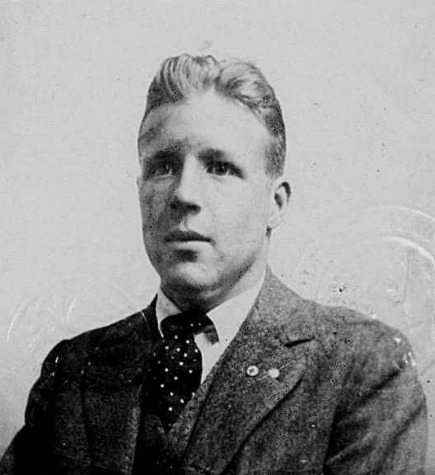It was on the morning of May 27, 1918, that this athlete won his final and most glorious victory. Commanding a gun, at an outpost near the German front line, he and his crew were attacked by a squad of fifty or sixty of the enemy's picked men. A companion tells the story:
"The Germans wanted prisoners for information, and succeeded in capturing two infantrymen in our front line. As the Germans started back with their prisoners, Corporal Conover and his men picked up their rifles and we all began to pick off the Germans who were taking the Americans back. We succeeded and no prisoners reached the German lines. It was while we were trying to save these two men that Corporal Conover was shot. I was lying next to him on the parapet. He was cool, enthusiastic, doing good work. He asked me once 'if I saw that one go!' After a few minutes I looked around and missed him. He was lying in the trench. A man from his crew and I asked if he were hurt. He saw his man without a rifle, and said with a smile on his face, 'I'm through. Take my rifle.' He died with the knowledge that he had done his utmost in the performance of his duty."
"Dick" Conover was within two months of graduating from St. Paul's School, Concord, New Hampshire, when the opportunity came for him to join the American Field Service. Incensed over the death of his favorite cousin, a member of the Princess Pat Regiment, then in Belgium, he promptly accepted and, at the age of nineteen, sailed for France. Being unusually big and strong, he was chosen for the camion service, and drove a truck for six months on the Aisne front. During these six months he became very fond of the French people and felt that he must do more than he was doing.
So in November, instead of returning home, he enlisted in the American army and was sent almost immediately with a machine gun corps of the 18th Infantry to Gondrecourt. After training there for some time they were sent to the trenches, and from that time on were constantly in action. In February he was made Corporal in charge of a machine gun. His officer said of him, "Corporal Conover was one of the most manly, upright characters I have ever met. His conduct in the machine gun company was beyond criticism. On former tours at the Front his high courage was tested and proved."
To do a man's work in the war, and to do it well, was "Dick" Conover's sole concern. In one of his earlier letters he wrote, "When you think that all the boys my age in France are at the Front you can hardly say that I am too young. You must remember that I am nineteen, which is practically twenty, and twenty is a man. I am sure if you were over here and actually saw how things are, you would not consent to my returning home without first having served in the real fight."
Though disappointed at not being able to pass examinations for aviation, while driving his camion, Conover managed to find some consolation in the fact that "if by any chance anything should happen to me, Mother, you will know that my work here has not been in vain, and that, however small a part I have played, I have played it with all my heart." The magnificent simplicity of it! And its utter genuineness! Just how whole-heartedly he played that part to the very end is testified to by his platoon sergeant. "Although but recently in the service and giving promise of speedy advancement, Corporal Conover gladly and willingly offered up his life on the altar of his country, and died with a smile, as honorable and brave in death as in life."
It was the end "Dick" Conover most coveted. Big, patient, and understanding, "cast in the heroic mould," as Dr. Drury, head master of St. Paul's, describes him, " He died at his post --- the noblest thing a man can do""
Source of information: www.findagrave.com

PRIVATE CITIZENS SUPPORTING AMERICA'S HERITAGE
American
War Memorials Overseas, Inc.
War Memorials Overseas, Inc.
Conover Richard Stevens, II
Name:
Richard Stevens, II Conover
Rank:
Private
Serial Number:
Unit:
18th Infantry Regiment, 1st Infantry Division
Date of Death:
1918-05-27
State:
Rhode Island
Cemetery:
Somme American Cemetery, Bony, France
Plot:
D
Row:
4
Grave:
4
Decoration:
Comments:
